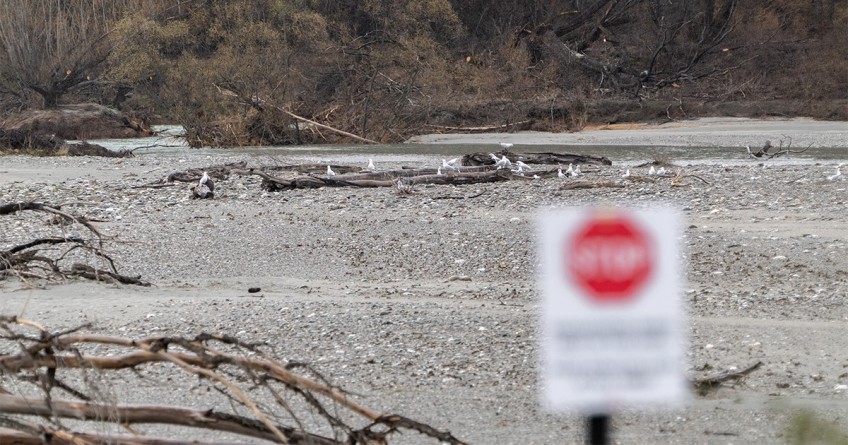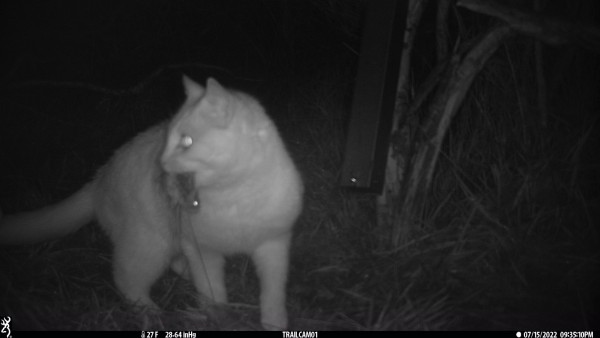Cameras and traps control cats at Tucker Beach Wildlife Reserve

On the back of efforts to stamp out feral and stray cats at Tucker Beach Wildlife Reserve, conservationists are urging cats and native biodiversity can live in harmony.
Friends of Tucker Beach Wildlife Reserve volunteers uninvasively monitored for cat activity and set up live traps last year on the Department of Conservation owned reserve.
Live-trapping prevents injury and allows prowlers to be scanned for identification such as a microchip or collar so the animal can be returned home.
The initiative is part of the ongoing pest and predator control programme on the 150-hectare site.
Rabbits are a major problem in the area because they contribute to cats becoming cosied as pests as part of the guild of ferrets, stoats, hedgehogs, rats and possums.
Four live cat traps were installed.
While the group has caught three cats in their 87-strong trap network the live-trapping project has not had the same success.
The approach, with help from Southern Lakes Sanctuary, did not catch any cats but still left a trace.

Domestic and feral cat hunters are a threat to protected birds and skinks at a Queenstown reserve, where volunteers are working to deter the hunter (Image: Facebook/Tucker Beach Wildlife Reserve).
Project ecologist for the Tucker Beach Jobs for Nature Restoration Project and the Friends of Tucker Beach Wildlife Management Reserves Dawn Palmer says the project found evidence of the hunters, including a stone throw from a threatened species.
“Monitoring revealed the presence of cats hunting in the reserve and cameras monitoring the nesting birds over the summer also detected cats in the breeding habitat of the banded dotterels.”
More recently the volunteers improving the safety of the braided river habitat has seen triumph for migratory birds.
She says the trust saw at least 17 juvenile black-fronted terns, 110 black-gilled gulls fledged from 60 nests, and nine banded dotterels fledged from 11 nests.
“It represents the best season in a long while for gulls and terns.”
Grey warblers and kōtare/kingfishers and backyard birds like tui and bellbirds reside in the reserve, alongside skinks.
Although typically known as bird-hunters, cats also have caused significant harm to some of the countries rarest reptiles, unique to Central Otago.
Predation has further compromised endangered Grand and Otago skink populations, Predator Free New Zealand Trust Chief Executive Jessi Morgan says.
Cats have been found to cram down the scaly creatures, which they cannot digest.
Ms Morgan says cat stomachs full of dead lizards have been found in post-mortem reports.
At-risk and endangered species bearing the brunt of the pest problem is calling attention to a need for behaviour change.
With large numbers of feral and stray cats, recognising they can live in harmony with biodiversity is key to safeguarding their future, Ms Morgan says.
“We have this strong affinity to our native species and we want them to be able to thrive, so we don’t want our cats to be wiping them out.”
Even so, it is valid for owners to worry their pet will be targeted in a culture where they are free to roam.
Ms Morgan says regulation will allow cat owners to be protected because it reduces the chance of companion and stray cats becoming feral and therefore becoming more susceptible to trapping.
A National Cat Management Act would give policy direction to local councils and as a result would equip community volunteer groups better to boost biodiversity, Ms Morgan says.
Tucker Beach Reserve communicate its intention to trap cats and help ensure owners don’t allow them to wander via their Facebook page.
Queenstown Cat Rescue is the first point of contact if roamers are found in the reserve.
After taking photographs of the found feline, it is often taken to a vet for microchipping.
There are currently no live capture cages set on the reserve.
Main image (Facebook/Tucker Beach Wildlife Reserve): Black-fronted terns and black-gilled gulls make a home at Tucker Beach Wildlife Reserve, helped kept safe by a group of passionate volunteers.


























